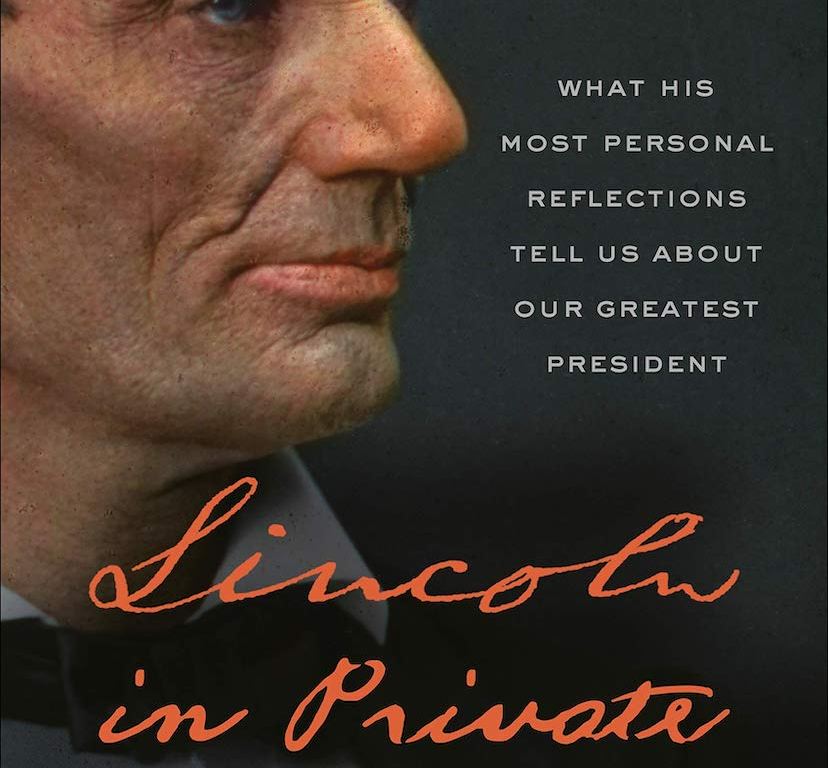“Of making many books there is no end,” Ecclesiastes 12:12 says, and nowhere is this truer than of books about Abraham Lincoln. The problem confronting would-be Lincoln authors is that every angle of Lincoln’s life seems to have been covered in exhaustive, not to mention exhausting, detail. Ronald C. White is one of those authors, with three books to his credit already: A. Lincoln (2009), The Eloquent President (2005), and Lincoln’s Greatest Speech (2002).
And yet, in Lincoln in Private, White has found a new angle to understanding America’s greatest president—or second greatest if you put George Washington first. That angle comes from the 111 extant notes Lincoln wrote himself over the course of his lifetime. These notes outline his thinking on issues both great and small. He wrote them for himself, not necessarily as the first drafts of subsequent speeches or articles, but as an exercise in knowing his mind on a given topic.
In the Appendix, White brings together into one place all 111 notes, which had been previously scattered across the pages of Nicolay and Hay’s 10-volume Complete Works of Abraham Lincoln (1905) and Roy P. Basler’s 11-volume Collected Works of Abraham Lincoln (1953–55) and Supplement (1974). These can also be accessed online through the Papers of Abraham Lincoln project.
More importantly, White culls 12 of these notes for extended comment. He organizes the notes under three headings, the three main phases of Lincoln’s adult life: Lawyer, Politician, and President. I was aware of two of these notes prior to reading the book: Lincoln’s notes regarding slavery (pp. 47–53, 181–182) and the divine will (pp. 149–160, 261). The former is a reductio ad absurdum of pro-slavery arguments. The latter is a reflection on what providence might be accomplishing in the Civil War, whose logic, though not words, is reflected in the final paragraph of Lincoln’s Second Inaugural.
The other 10 notes were new to me. What struck White and will strike the reader is Lincoln’s intellectual curiosity. Whether writing about Niagara Falls, the legal profession, the sectional character of the Republican party, the nature of democracy, pro-slavery theology, or secession, Lincoln strove to understand another person’s beliefs from within that belief system. Precisely because of this empathetic reading, Lincoln was able to respond cogently, concisely, and critically to views opposite his own. Throughout, he demonstrates an ability to get at the basis of an opponent’s argument and refute it.
Take his Fragment on Pro-Slavery Theology (pp. 106–116, 221–222), which he wrote in response to Rev. Frederick A. Ross’s Slavery Ordained of God. Lincoln summarizes Ross’s argument this way: “The sum of pro-slavery theology seems to be this: ‘Slavery is not universally right, nor yet universally wrong; it is better for some people to be slaves; and, in such cases, it is the Will of God that they be such.”
For the sake of argument, Lincoln left to one side whether slavery was in fact the will of God, saying, “The Almighty gives no audible answer to the question [of slavery versus emancipation], and his revelation—the Bible—gives none—or, at most, none but such admits of a squabble.” Lincoln did not think slavery was God’s will: “‘Give to him that is needy’ is the Christian rule of charity,” he wrote; “but ‘Take from him that is needy’ is the rule of slavery.’”
Even so, Lincoln advanced two arguments against slavery. First, responding to the pro-slavery argument that slavery was a positive good, he wrote: “As a good thing, slavery is strikingly peculiar, in this, that it is the only good thing which no man every seeks the good of, for himself.”
Second, Lincoln doubted whether a slaver had the necessary partiality to judge whether slavery or freedom was best for another person. “Wolves devouring lambs,” he sneered, “not because it is good for their own greedy maws, but because it is good for the lambs!!!” For Lincoln, pro-slavery moral arguments merely masked economic interests.
I quote this note at length because, as a minister, I am interested in how Lincoln demonstrated an ability, uncommon to too many antebellum theologians, to unmask the self-interest underlying pro-slavery theology. In those notes that advance a thesis or argument, Lincoln shows an uncanny, sharp ability to go straight at the heart of a bad argument.
So, yes, of the making of books about Lincoln there is no end, but Lincoln in Private shows that there are still reasons to write about the man, still nooks and crannies of his life and thought that are worth exploring. If you’d like to explore that life in greater breadth and depth, I’d recommend the author’s biography, A. Lincoln.
Book Reviewed
Ronald C. White, Lincoln in Private: What His Most Personal Reflections Tell Us about Our Greatest President (New York: Random House, 2021).
P.S. If you liked my review, please click “Helpful” on my Amazon review page.


One thought on “Lincoln in Private | Book Review”